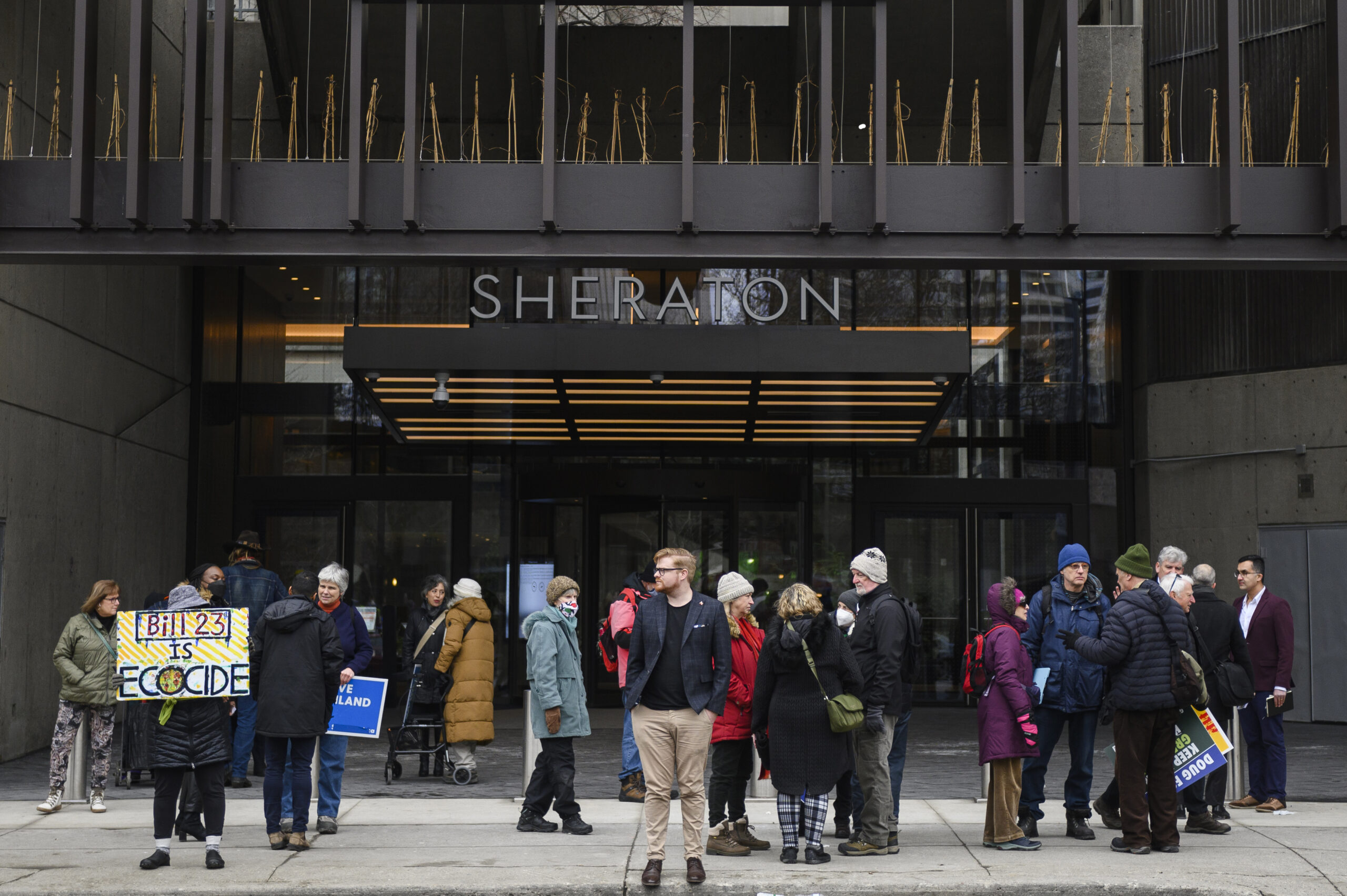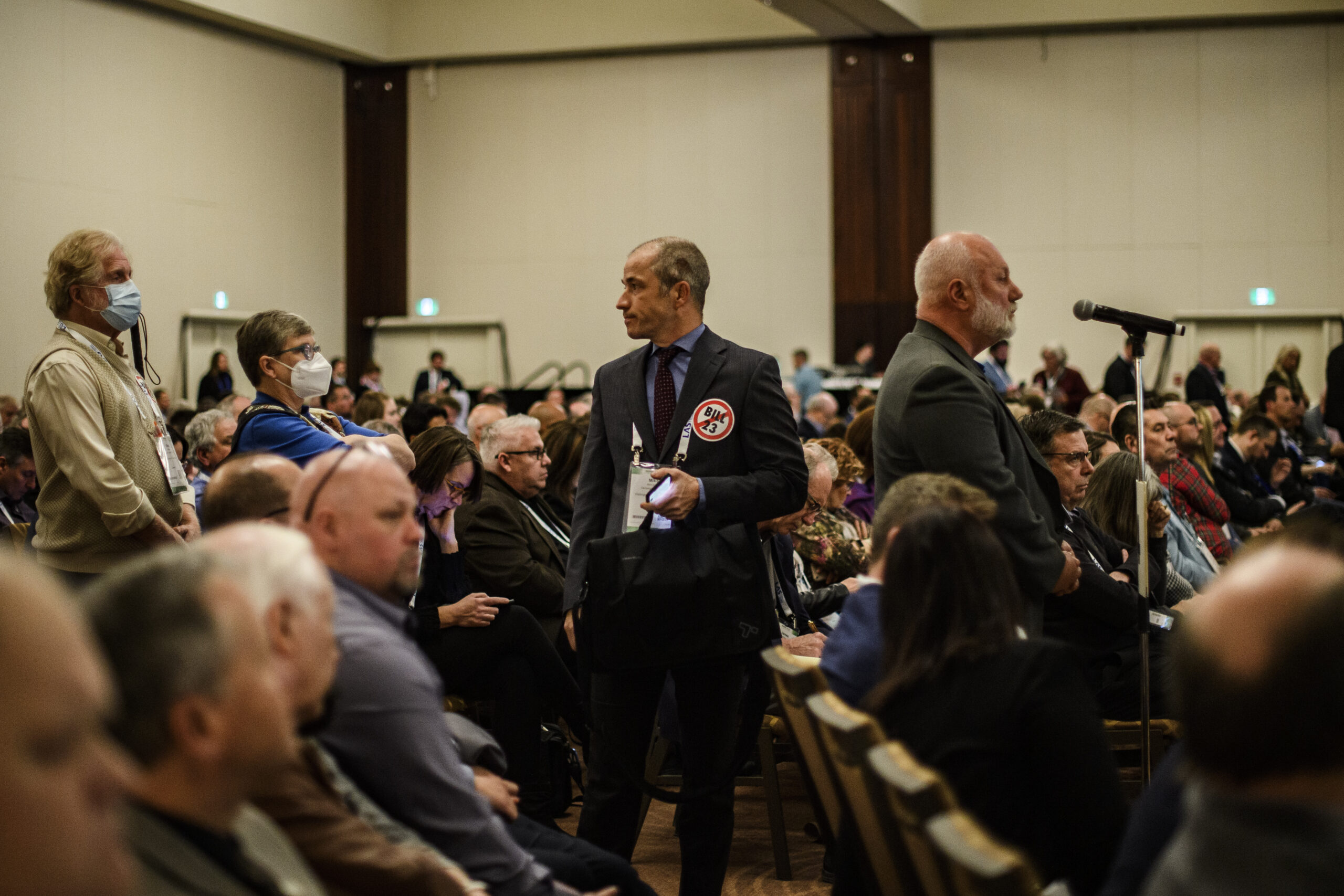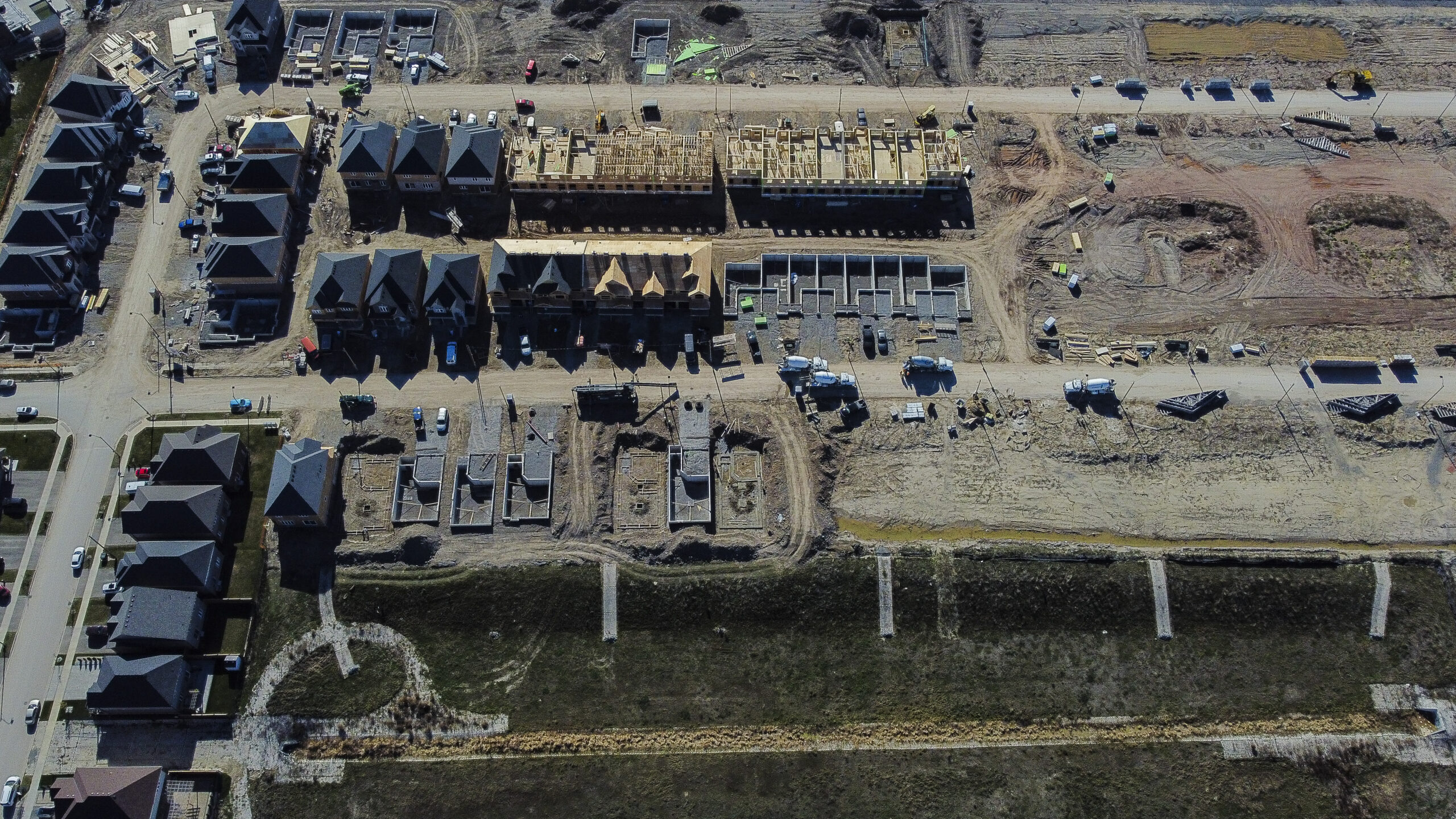
The federal government ‘sees a long-term future for the oilsands.’ Here’s what you need to know
An internal document obtained by The Narwhal shows how the natural resources minister was briefed...
In the 37 years that he’s been a politician in Ontario’s Halton Region, Colin Best says he’s never seen a law as surprising or as broad as the Ford government’s latest development plan, Bill 23 or the More Homes Built Faster Act.
Six months ago, Best was elected president of the Association of Municipalities of Ontario, which represents nearly all the municipalities in the province, from the city of Mississauga (population: 717,961) to the town of Latchford in northeastern Ontario (population: 327). Two months into his tenure, on October 24, almost every town and city in Ontario elected a mayor that promised constituents their number one priority would be housing.
The very next morning — weeks before the new mayors and councils of 444 municipalities would be officially sworn in — Premier Doug Ford and Housing Minister Steve Clark introduced the legislation, which proposed an unprecedented weakening of local decision-making and oversight over development as well as a massive gutting of environmental protections.
“It was such a rush,” Best, a regional councillor in Halton and a local councillor in Milton, said. “We had no consultation. We weren’t invited to any meetings. In 125 years, it’s the biggest affront to Ontario’s municipalities that I’ve ever seen.” With city councils in limbo so soon after the election, municipalities were largely unable to make immediate decisions on how to respond or adapt to Bill 23.
Best’s predecessors are now the ones taking municipalities’ power away. Clark and Graydon Smith, the minister of natural resources who is overseeing the gutting of conservation authority powers proposed by Bill 23, are both former presidents of the association, with long careers in municipal politics before moving to the province. Best says the municipal leaders-turned-ministers have to “show cabinet solidarity and follow the party line which the premier espouses,” but he was still taken aback by the extent of Bill 23’s impact.
In mid-February, Best sat down for a Zoom interview with The Narwhal. He was joined by the association’s executive director, Brian Rosborough, a long-time policy advisor to past Ontario governments who now ensures the association acts as a bridge between cities and the province.
In the months since Bill 23 dropped, Best, Rosborough and a long list of mayors and councillors have become the canaries in the coal mine of Ontario politics, sounding the alarm on the unintended consequences of Ford’s housing plan and urging the province to recalibrate its approach. Most focus on the devastation to local governance, though many also highlight the environmental damage potentially set in motion by Bill 23, which weakens or eliminates wetland protections, expert oversight of watersheds and protection of species-at-risk habitat, among other measures aimed at accelerating development.
“Bill 23 was a complete surprise, and did not reflect consultation with Ontario’s cities in any way,” Rosborough said.
As Ontario nears a budget day on March 23, leaders at towns and cities are nervous about what other bombshells the Ford government might be preparing to drop. But they also hope some moves might be positive, since the Ford government has assured cities help is coming to support their ability to create sustainable, emissions-free, transit-friendly cities and maintain the environment. The province has also promised cities won’t be handcuffed by Bill 23.
Here are some issues Best and Rosenborough raised during their hour-long conversation with The Narwhal.

Last February, the Association of Municipalities of Ontario released a 20-page “blueprint” to address the provincial housing crisis. It had 91 recommendations, the very first of which was a call to work collaboratively across “all orders of government.”
The second recommendation was that the crisis be addressed with “a human rights approach” to address inequities faced by Black, Indigenous, racialized and other marginalized people. The third was that housing be “treated as an essential social good … rather than as a primary means to store and accumulate wealth.”
Best and Rosborough told The Narwhal that Ontario cities have been sounding the alarm on housing affordability — and the effects on the most vulnerable — for many years. The pandemic, and the subsequent massive spike in demand for larger, spacious housing it created, made the issue more urgent for all levels of government. “That took everyone by surprise, and reflected that we didn’t have a supply … and suddenly became a hot political issue for the federal and provincial government,” Rosborough said.
In December 2021, the Ford government put together a housing affordability task force of nine people, including members of the banking, development and real estate industries as well as academic and non-profit representatives. Former Progressive Conservative leader Tim Hudak was on the task force — but not one city official. Rosborough said cities were “categorically excluded,” despite the task force’s focus on changing a planning and infrastructure regime that municipalities shape and execute.
The association was shut out even though it has had a unique memorandum of understanding with the provincial government for over 20 years, which is rooted in collaboration and consultation. Per the agreement, municipal representatives are to meet regularly with cabinet members to ensure the province is making “fully informed decisions,” Rosborough explained. While the association and various mayors and councils are still trying to have those conversations, some have also taken the fight to the public sphere after being locked out of the process.
Best said that because the province’s development plan doesn’t include input from local governments, it fails to help people who need housing most. Since he became president, Ontario mayors have been urging the province to consider development that will address “a massive homelessness crisis” that cities have been trying to address independently through social programs.
In a recent call to action, the association said that while the pandemic exacerbated the problem, the lack of affordable housing is a “made-in-Ontario crisis” caused by three decades of disinterested governments. Its research finds that on any given night at least 16,000 Ontarians experience homelessness, and a disproportionate number of them are Indigenous. Rosborough said he has heard from rural communities that people are “living in seasonal trailer parks and encampments in the woods” and Bill 23 does not address their core needs. Greater Sudbury, Waterloo Region and Peterborough, among many other communities, have been struggling to house encampment residents.
Rosborough told The Narwhal that Ontario spends $2,000 less per person on services and programs than the average of all 12 provinces and territories.
“The homelessness crisis in Ontario is the direct result of provincial indifference and provincial underinvestment,” Rosborough said. “And it can only be solved properly if the [provincial] government is prepared to come to the table with us … and do something about it.”

The gutting of conservation authority powers has put more responsibility to minimize the environmental impact of development on municipalities and First Nations, without any increase in resources. Because of this, and fear of damage to the natural environment, municipalities and the Chiefs of Ontario have urged the province to roll Bill 23 back.
In its initial response to Bill 23, the Association of Municipalities of Ontario said the bill is “undermining the financial capacity of municipalities to support growth and diminishing essential environmental protections.” At a rural municipal conference in January attended by every provincial minister, Best said “eliminating environmental protections in order to build housing is a false economy” — a term that describes an action that saves money initially but which, over a longer period of time, results in more money being spent. The association has also said that the province is perpetuating “a false premise” that the housing crisis can be fixed by lessening infrastructure funding and environmental protections.
Among the 91 recommendations in its housing blueprint, the association repeatedly asks all levels of government to “foster complete communities,” where the public is made “more aware of the negative impact of sprawl on the environment [and] traffic congestion …”
Rosborough told The Narwhal all Ontario cities are concerned that Bill 23 will create unfettered development where people don’t have access to the green space “that they need in order to be a healthy community.”
With Bill 23, Best said the province is helping the development sector but leaving municipalities to build and establish the essential services needed before construction can get started — water, sewage, transit, parks, electricity, waste — again, without more money.
“I’m a former property appraiser. I know that without those services, those houses can’t be built,” Best said. “You can plan all you want, you can do [minister’s zoning orders, known as] MZOs, and open the Greenbelt, and everything else, but unless you have the water and sewers, nothing will be built. We take care of all that.”
“We seriously question whether the province’s equation makes sense,” Rosborough added, saying this essential infrastructure is unaffordable without the development charges eliminated by Bill 23. “We think there are some very serious flaws in the equation that says you just need to undermine our existing planning and infrastructure financing framework that has worked for generations to support rapid growth in this province.”

By removing municipalities’ ability to charge developers for construction, Bill 23 has also removed much of the funding used for social housing and other services. The association has calculated the More Homes Built Faster Act would transfer $1 billion in costs from developers to taxpayers.
With the costs of providing services increasing, development charges were actually well below what municipalities need to keep up, Best said — they should be rising, not falling. To make up for the shorthall, a number of municipalities have announced property tax increases, the lowest so far at 3 per cent, in Mississauga, and the highest announcement of an 8.55 per cent hike, in Waterloo Region. NDP MPP Jessica Bell is tracking property tax increases and has found that 33 municipalities that have made decisions within this range.
Since 1997, municipalities have been subject to an annual financial audit, as cities manage half a trillion dollars in public assets. In the wake of Bill 23 outrage, Housing Minister Steve Clark has said he will be doing a closer audit to find ways to help municipalities after the association asked for consultation and support. Rosborough and Best say they are “very confident in our numbers.”
The challenges are great. The province wants Best’s municipality of Milton to build 2,000 homes every year over the next decade. The town has only reached that number twice in the last 20 years. And today, there are 150 planning positions across Ontario cities that are struggling to attract talent and get the construction process started.
When asked in the legislature on March 1 what the government would do to help pay for this infrastructure, Clark didn’t answer directly. Instead he cited an 800 not-for-profit home project in Scarborough that is “moving forward” because of the changes proposed in Bill 23.
Best remains skeptical. “If you’re going to cut a billion dollars out of provincial municipalities, we’re going to be in dire straits,” he said. “We’re on the frontlines here.”
Updated: This story was updated on March 7, 2023, at 10:51 a.m. ET to reflect that the City of Toronto is not a member of the Association of Municipalities of Ontario, as it is governed by its own provincial act.
Get the inside scoop on The Narwhal’s environment and climate reporting by signing up for our free newsletter. On March 17, federal Conservative Leader Pierre Poilievre...
Continue reading
An internal document obtained by The Narwhal shows how the natural resources minister was briefed...

Notes made by regulator officers during thousands of inspections that were marked in compliance with...

Racing against time, dwindling habitat and warming waters, scientists are trying to give this little-known...
